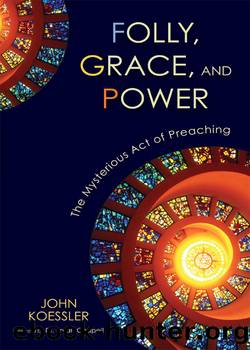Folly, Grace, and Power by John Koessler

Author:John Koessler [John Koessler]
Language: eng
Format: epub
ISBN: 978-0-310-39546-1
Publisher: Zondervan
Published: 2011-01-15T00:00:00+00:00
chapter 7
PROPHET, PRIEST, OR STAND-UP COMEDIAN?
The first sermon I can remember hearing was preached by a pastor whose thundering declamation seemed to rattle the light fixtures. I was in elementary school at the time. I do not remember a word of his message, only the terror it inspired in me. Perhaps that is why I recoiled at my motherâs beaming delight when she learned that I felt called to preach.
âOh, Johnny,â she gushed, âyouâd make a darling minister.â
Darling was not the kind of preaching I had in mind. I did not want to mouth poetry in a clergymanâs tame frock. I had no intention of becoming a âdarling minister.â Camelâs hair and thundering declamation were more my style. I aspired to the prophetâs mantle.
Preaching in the Marketplace
The kind of preachers we become depends to a great extent upon our mental image of what a preacher is. According to Thomas G. Long, âpreachers have at least tacit images of the preacherâs role, primary metaphors that not only describe the nature of the preacher but also embrace by implication all the other crucial aspects of the preaching event.â1 This inner vision is often an imprint left by the force of personal experience. Our idea of what it means to preach is a mirror of those we have heard (or perhaps read) and admire. Our listeners are not the only ones who follow Paul or Apollos because of their style. We are just as prone to identify ourselves by and shape our ministries after our heroes.
But our expectations of ourselves are also influenced by the expectations our listeners have of us. In Athens, Paul took his stand in the marketplace and challenged the ideas of the philosophers (Acts 17:17 â 18). Today the marketplace is not merely a location. It is a way of thinking. Those who are seated before us see themselves as an audience, a self-identity that has been shaped primarily by the culture of television. This is a realm where ideas really are on the market and credence is given based on the quality of a viewerâs experience. As a result, the church has opinions about how it wishes to be addressed that are as strong â perhaps even stronger â than its notions of what it wants to hear. Todayâs listeners are more conscious of a speakerâs image than they are of a sermonâs line of reasoning, strength of argument, or its biblical content. We who preach to them have also been steeped in this culture and are tempted to try to hold their attention by the power of personality alone.
Since television is used to sell everything from deodorant to funerals, it is not surprising that some have urged contemporary preachers to look to this medium for role models in communicating the gospel.2 However, the ethos of television is radically opposed to the prophetic ethos of preaching. A quarter of a century ago, when television evangelists like Jim Bakker, Jimmy Swaggart, and Jerry Falwell were in their prime, Neil
Download
This site does not store any files on its server. We only index and link to content provided by other sites. Please contact the content providers to delete copyright contents if any and email us, we'll remove relevant links or contents immediately.
| Adult Ministry | Children's Ministry |
| Counseling & Recovery | Discipleship |
| Evangelism | Missions & Missionary Work |
| Preaching | Sermons |
| Youth Ministry |
The Rape Of Nanking by Iris Chang(2331)
The Secret Power of Speaking God's Word by Joyce Meyer(2259)
Chosen by God by R. C. Sproul(1768)
Crash the Chatterbox by Steven Furtick(1659)
Habits of Grace by David Mathis(1467)
Knowing God by J.I. Packer(1437)
How To Be Born Again by Billy Graham(1408)
A Prophet with Honor by William C. Martin(1378)
Peace with God by Billy Graham(1321)
God's Smuggler by Brother Andrew(1223)
Confronting Christianity by Rebecca McLaughlin(1221)
Whisper by Mark Batterson(1162)
Angel Dreams by Virtue Doreen Virtue Melissa(1149)
Missionaries by Norman Lewis(1140)
The Truth War by John MacArthur(1108)
The School of Biblical Evangelism by Ray Comfort(1102)
The Poems of Rowan Williams by Rowan Williams(1075)
Do Greater Things by Robby Dawkins(1050)
Eucharistic Miracles by Cruz Joan Carroll(1023)
